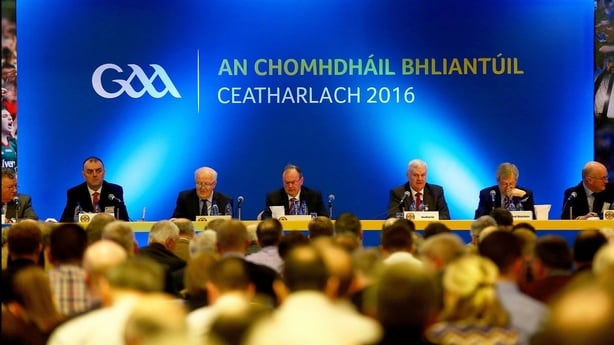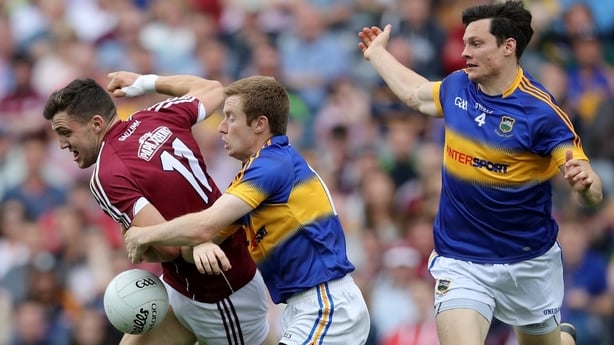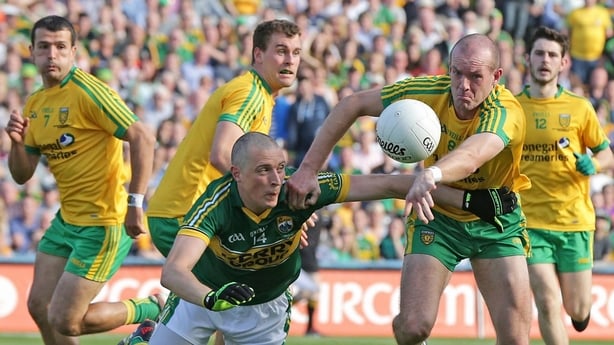Despite what some people would like you to believe, Gaelic football is an enjoyable game to watch and to play, writes Peter Sweeney.
The numbers of people who play it and pay to watch it in all conditions in every corner of the country should be proof of that.
But it’s not perfect and there are things that the GAA can do to improve the game. Here we take a look at three things Croke Park can do and three things that they shouldn’t do to ensure the continued good health of their most popular sport.
DO
Implement the rules
One of Gaelic football’s main problems is the sketchy implementation of its rules. The only clear tackle, for example, is a shoulder or a slap on the ball against the man in possession - nothing else.
But how often do we see players getting away with pushing, pulling, punching and a whole host of other infractions?
If the rules were applied consistently and across the board, there would be a lot less confusion about Gaelic football and it would be a better spectacle as a result. To do this Croke Park has to continue to invest in referee training and education.

Take power away from Annual Congress
The GAA’s greatest strength can also be its greatest weakness: it’s a democratic organisation and everyone can have their say.
This isn’t always a good thing - particularly when Annual Congress, held every February, flexes its muscles.
Some years Congress is in good humour and everything gets the green light. Others it’s more militant and there’s thumbs down on every motion.
This is not the place for decisions on the rules and structures for the game to be decided. That power should be devolved to a specific, and properly qualified committee that makes recommendations, conducts occasional experiments and takes the decisions that count.

Acknowledge that it’s a great game
Gaelic football is a great game and sometimes people in the GAA would do well to recognise that, but if you were to listen to some influential pundits you would believe that the the big ball game is in a constant state of crisis [by contrast to hurling, which is perfect and shouldn't be touched according to other experts].
Games develop naturally, trends change and different things come into fashion. Let this happen. Football is in as healthy a state as it has ever been, being played at a higher level than it’s ever been - and that goes at all levels because junior football is a hell of a lot better now than it was 20 years ago.
The problem that the GAA really need to tackle in the sport is club fixture lists.
DON’T
Implement the mark
The mark is due to be part of Gaelic football from the start of 2017, it’s here to stay and it’s hard to believe that anyone is prepared for it. It was introduced after a number of short experiments at low-key, non-inter-county competitions.
And this despite the fact that the mark has been properly trialled at senior inter-county level in the past and was done away with because it didn’t do much to improve the game.
The mark won’t see any more high fielding around the middle of the field, as romantics might suggest. The majority of marks we’ll see will be caught uncontested around the ’45’ into players’ chests.
Football is a possession game - no right-thinking manager is going to encourage their goalkeeper to root a kick-out down the middle of the field and risk losing the ball on the 50-50 chance of getting a mark.

Try to limit the hand-pass
Now that the mark has been introduced, Annual Congress [see above] may turn its sights on the hand-pass and we have all seen plenty of articles dedicated to ideas on how best to limit one of the core skills of the game.
Teams want to hang onto the ball and wait for the right opportunity to move it forwards quickly. This shouldn’t be seen as a problem.
The Kerry sides of the 70s and 80s - the greatest we saw - hand-passed the leather off the thing when it suited them. Watch old games where the ball was kicked more often and it’s simply infuriating to see possession mindlessly booted away into a contest.
React
As mentioned above, some people believe that Gaelic football is in a constant state of crisis. That’s why we got the black card and that’s why we have the mark.
The sin bin was a fairer and more effective deterrent than the black card, but that didn’t last long after trails in the last decade because influential inter-county managers, hurling as well as football in this case, threw the toys out of the pram.
A more recent outcry about cynicism in the game led to the situation we are in now, which puts major pressure on referees in particular in the biggest of games.
Sometimes the GAA should simply ignore those that shout loudest because they aren’t always right.

